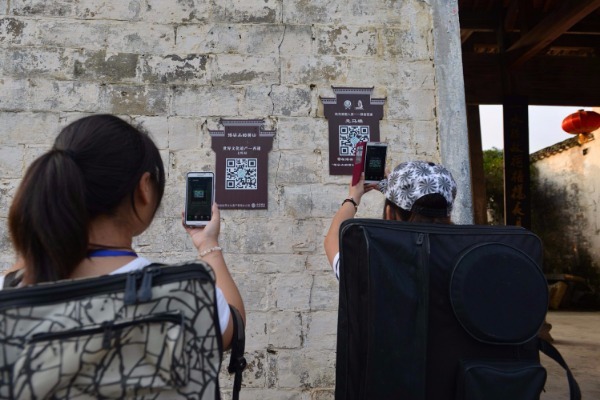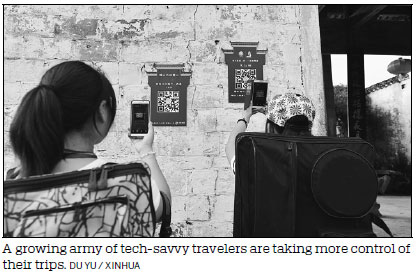When a holiday is a swipe away


Wan Ruyi has managed to travel far and wide with nothing but her mobile phone over the years.
The 28-year-old from Shanghai gets everything she needs on the road using various software applications.
"I first download public transportation app whenever I visit a new city," Wan says.
She then books hotels based on their proximity to the subway station and maps out her travel itinerary on the public transportation network too.
Wan also uses apps developed by domestic travel agencies, including Tuniu and Ctrip to book train and flight tickets, and travel website Mafengwo for tips from other travelers.
She also marks places and finds her way via the offline map Maps-ME when traveling abroad.
To date, she's been to roughly 100 cities in more than 20 countries, including the United States, Australia, Japan and Singapore.
"The apps allow me to better concentrate on learning things about the destination and finding places that really appeal to me," says Wan, adding that she used to do just sightseeing and pay no attention to what the tour guide had to say in group travel before she started using smart travel apps.
Wan is just one of the growing army of tech-savvy Chinese travelers who are taking more control of their trips.
The country's mobile tourism market is expected to hit 774.96 billion yuan ($115.82 billion) in 2018, up 21.9 percent as compared with the previous year, according to an internet data report by Ark Analysis, a data company based in Beijing.
Those born in the 1980s and 90s account for 80 percent of those using mobile apps to navigate during a journey.
The market was worth 635.6 billion yuan in 2017, up 16.3 percent year-on-year, the report says.
Chinese travelers paid 149.72 million visits abroad last year, up 14.7 percent as compared with the previous year, the Ministry of Culture and Tourism says. And the domestic tourism market saw 5.54 billion traveler visits in the same year, up 10.8 percent.
To date, more tourism apps have appeared offering destination introduction, schedule planning and transactions for travelers, says a report jointly done by Xinhua News Agency and major domestic travel agency Tuniu.
For now, travelers can get access to more than 60 kinds of services and products on Ctrip's app, the agency claims. And Tuniu's orders booked via mobile terminals covered up to 90 percent of all its online orders as of the end of 2018, the travel agency reports.
Meanwhile, the business potential of the mobile app sector has also encouraged more tourism players to throw their hats into the ring.
So, Tencent has launched a mini tourism program that enables individual travelers to better explore what foreign lands have to offer.
"Tourism authorities from foreign destinations have approached us to create something for Chinese tourists," says Zhang Yaohui, a senior official with Tencent's product technology operations.
The program is embedded in the company's WeChat, which has more than 1 billion active users.
"You don't have to download it and can use it directly from your WeChat account," says Zhang.
A total of 400,000 travelers have used the program when traveling abroad, and most of them are between 25 and 40, and prefer traveling, according to their own plans.
Tencent's program is different from conventional travel agencies that take care of pre-travel services, such as hotel and flight bookings. But it offers tourists information updates about local scenic spots, festivals and real-time geographical locations, says Zhang.
"The information is all from authoritative channels," he says. Online maps and audio guides are also available for individual travelers.
"So, if you go to a ski resort, we not only tell you where it is, but where to find ski gear, eat and buy tickets," says Zhang.
There are also interactive games for those who are interested.
"And you can also tick off the place of your visit on a map, which can be done only when you're in the place," says Zhang.
Then, the tourist attractions that are ticked off on the map offer visitors souvenirs.
"By the end of their travels, tourists using the program get a trajectory of their trip," says Zhang.
Besides, the app offers functions such as online translations, a tax rebate service and a travel account book.
To date, Finland's capital Helsinki, Canada's Vancouver, Sweden's capital Stockholm, and American Airlines have all applied to join Tencent's tourism program.
Speaking about why Vancouver joined the program, Stephen Pearce, vice-president of marketing at Tourism Vancouver, says: "When you think about traveling to Vancouver, you want information served up which is relevant, timely, and - most important - in an environment that you can trust. "Tencent provides that environment and that credibility (for Chinese visitors)."
So far, many of Vancouver's tourism businesses are posting QR codes, which allow them to track users who visit their establishments and attractions.
"Surprisingly, some businesses that didn't think they were attracting visitors from China are seeing great results. The program is helping us better understand how visitors are experiencing our destination. And it is giving us some great insights into ways for Vancouver to be more relevant and engaging," says Pearce.
Speaking about Tencent's plans, Zhang says he hopes it can take more of its smart technology abroad.
"China's internet service is already ahead the world," says Zhang.
"For example, some (domestic) airports let customers know where they can find a toilet or where their luggage is any point of the time."
Zhang says Tencent is also developing modules in the program, where tourism destinations will only need to check off the function modules according to their needs and get their platform operational automatically.
With 5G coming down the pike, experts say more surprises are on the horizon.
Tuniu's CTO Chen Shihong says that technologies such as artificial intelligence and voice search will be integrated into the current offering, thus offering a future you can only dream of now.
yangfeiyue@chinadaily.com.cn

(China Daily 04/20/2019 page13)

































